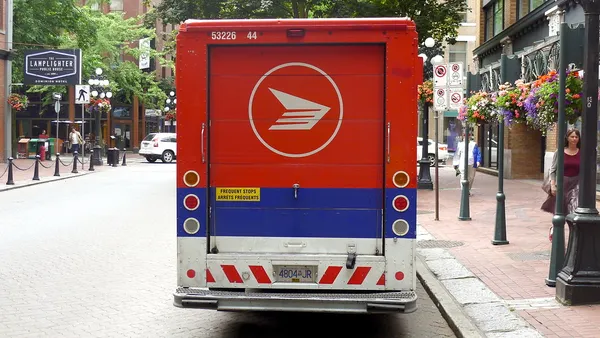Dive Brief:
- FedEx will expand its electric delivery fleet by 1,000 vehicles, purchasing 100 vehicles directly from Chanje Energy and leasing another 900 from Ryder System, according to a press release.
- FedEx Express will operate the vehicles, using them for commercial and residential delivery throughout the U.S. as a part of their "Reduce, Replace, Revolutionize" sustainability program.
- The electric vehicles (EVs) will have a maximum capacity of around 6,000 pounds, be capable of traveling 150 miles off a single charge and avoid 20 tons of emissions per vehicle in each year of use, according to the release.
Dive Insight:
FedEx boasts it has been using EVs as part of its fleet for nearly a decade. In the past year the company's goals have resonated in action, capped most recently by the Chanje announcement.
Last spring, FedEx followed UPS' lead in ordering 20 Tesla semi electric trucks to add to its freight fleet in 2019. Even at a hefty price tag of $150,000 to $180,000 per truck, FedEx is betting the enhanced technology for the LTL trucking unit, combined with the energy cost savings at a steep discount from normal diesel fuel, will make the added investment in EVs pay off over the long haul, as highlighted in its corporate social responsibility goals.
The goals may be admirable and socially responsible, but at the end of the day what will determine FedEx' future course is whether these types of fleet vehicles are a superior method for freight delivery.
The technology supports the theory, as in addition to lower energy costs, EVs have fewer moving parts, which means less maintenance and lower rate of failure. However, these economies of scale only take hold over a sufficient length of time.
As Logistics Viewpoints highlights above, there is a long-term breakeven point these fleet trucks must approach where the operational cost savings will justify the initial capital investment.
Furthermore, the distinction between delivery in urban areas and long-haul transport remains uncertain. In urban areas, EVs offer high benefits due to the combination of short range, lower maintenance and lower social cost by way of pollution. Long haul trucking, by contrast, requires a 300- to 500-mile electric battery range, as well as a much higher price tag.
FedEx appears to be testing the waters in both instances, investing in new vehicles for urban as well as long-haul deliveries. The Chanje investment hints that, for now, EVs in urban deliveries offer a high enough ROI.














